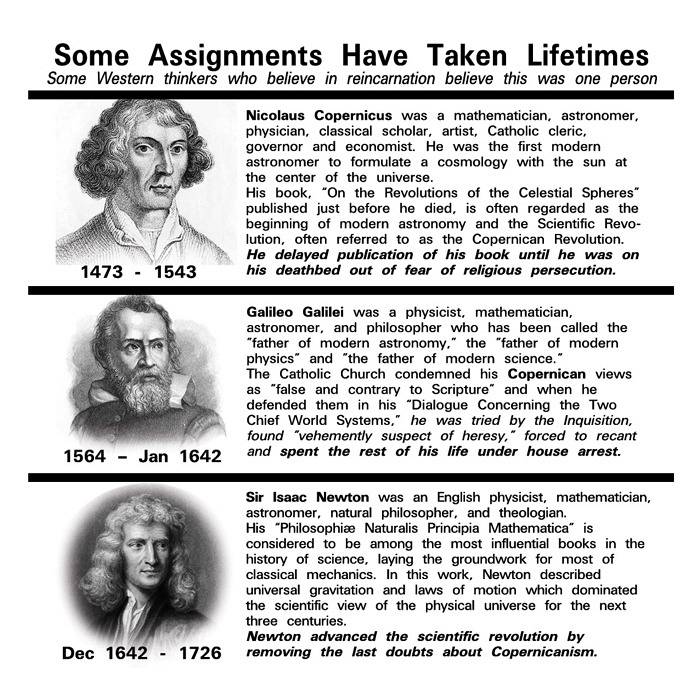Lifetimes
Some Assignments Have Taken Lifetimes
Some Western thinkers who believe in reincarnation believe this was one person.
Nicolaus Copernicus (1473 - 1543) was a mathematician, astronomer, physician, classical scholar, artist, Catholic cleric, governor and economist. He was the first modern astronomer to formulate a cosmology with the sun at the center of the universe.
His book, “On the Revolutions of the Celestial Spheres” published just before he died, is often regarded as the beginning of modern astronomy and the Scientific Revolution, often referred to as the Copernican Revolution.
He delayed publication of his book until he was on his deathbed out of fear of religious persecution.
Galileo Galilei (1564 - Jan 1642) was a physicist, mathematician, astronomer, and philosopher who has been called the "father of modern astronomy," the "father of modern physics" and "the father of modern science."
The Catholic Church condemned his Copernican views as "false and contrary to Scripture” and when he defended them in his “Dialogue Concerning the Two Chief World Systems,” he was tried by the Inquisition, found "vehemently suspect of heresy," forced to recant and spent the rest of his life under house arrest.
Sir Isaac Newton (Dec 1642 - 1726) was an English physicist, mathematician, astronomer, natural philosopher, and theologian.
His “Philosophiæ Naturalis Principia Mathematica” is considered to be among the most influential books in the history of science, laying the groundwork for most of classical mechanics. In this work, Newton described universal gravitation and laws of motion which dominated the scientific view of the physical universe for the next three centuries.
Newton advanced the scientific revolution by removing the last doubts about Copernicanism.
Some Western thinkers who believe in reincarnation believe this was one person.
Nicolaus Copernicus (1473 - 1543) was a mathematician, astronomer, physician, classical scholar, artist, Catholic cleric, governor and economist. He was the first modern astronomer to formulate a cosmology with the sun at the center of the universe.
His book, “On the Revolutions of the Celestial Spheres” published just before he died, is often regarded as the beginning of modern astronomy and the Scientific Revolution, often referred to as the Copernican Revolution.
He delayed publication of his book until he was on his deathbed out of fear of religious persecution.
Galileo Galilei (1564 - Jan 1642) was a physicist, mathematician, astronomer, and philosopher who has been called the "father of modern astronomy," the "father of modern physics" and "the father of modern science."
The Catholic Church condemned his Copernican views as "false and contrary to Scripture” and when he defended them in his “Dialogue Concerning the Two Chief World Systems,” he was tried by the Inquisition, found "vehemently suspect of heresy," forced to recant and spent the rest of his life under house arrest.
Sir Isaac Newton (Dec 1642 - 1726) was an English physicist, mathematician, astronomer, natural philosopher, and theologian.
His “Philosophiæ Naturalis Principia Mathematica” is considered to be among the most influential books in the history of science, laying the groundwork for most of classical mechanics. In this work, Newton described universal gravitation and laws of motion which dominated the scientific view of the physical universe for the next three centuries.
Newton advanced the scientific revolution by removing the last doubts about Copernicanism.
